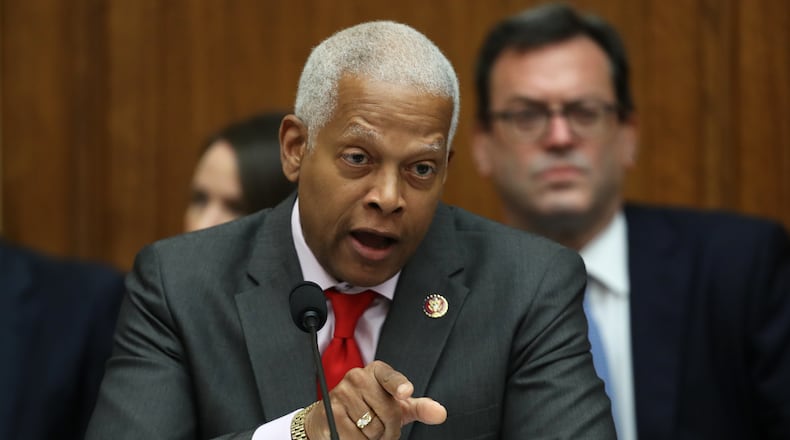A pair of senior Georgia lawmakers had two very different objectives as they questioned former special counsel Robert Mueller Wednesday.
Early in his back-and-forth with Mueller, U.S. Rep. Doug Collins of Gainesville, the top Republican on the House Judiciary Committee, sought to establish that the longtime prosecutor conducted a thorough review of Donald Trump and couldn’t charge the president with any crimes.
“The president’s attitude towards the investigation was understandably negative, yet the president did not use his authority to close the investigation,” said Collins, even though Trump “knew he was innocent.”
“Russia meddled in the 2016 election. The president did not conspire with Russians. Nothing we hear today will change those facts,” he added.
Read more: Georgia's Doug Collins stepping into the Mueller spotlight
Collins then launched into a muddled and somewhat testy exchange with Mueller touching on Trump’s refrain that there was “no collusion” with Russia.
Collins, who himself worked as a lawyer before being elected to Congress in 2012, asked Mueller whether he considered collusion “synonymous” with conspiracy. Put another way, he was asking whether Trump was exonerated of collusion given Mueller’s conclusion that the president didn’t criminally conspire with the Kremlin.
More background via the Associated Press:
Technically, collusion isn't a specific crime, but in his report, Mueller acknowledged that in common parlance, "collusion is largely synonymous with conspiracy as that crime is set forth in the general federal conspiracy statute." But when Collins asked him Wednesday if they were colloquially equivalent, Mueller said "No."
Citing passages from the report, Collins repeatedly pressed Mueller on whether he was contradicting that conclusion in his testimony. The exchange was an awkward one, with the prosecutor at multiple points asking the fast-talking Collins to repeat his questions.
Mueller ultimately didn’t give Collins much to work with.
“I leave it with the report,” Mueller concluded.
“Hopefully … out of your own report we can put to bed the collusion and conspiracy,” Collins responded.
U.S. Rep. Hank Johnson, D-Lithonia, used his five minutes of questioning to quiz the ex-special counsel about a June 2017 incident in which Trump urged White House Counsel Don McGahn to tell Deputy Attorney General Rod Rosenstein to fire Mueller because of perceived conflicts of interest.
McGahn never carried out the directive, but Democrats see the episode as evidence of potential obstruction of justice on behalf of the president.
Read more: Georgia lawmakers will have prominent roles in Mueller questioning
Mueller largely responded with “yes” or “no” answers to Johnson’s questions but ultimately told the Democrat “to rely on what we wrote in our report.”
Earlier in the hearing, Mueller said his report found “insufficient evidence of the president’s culpability.”
As the event stretched into its third hour, freshman U.S. Rep. Lucy McBath, D-Marietta, used her two minutes of speaking time to thank Mueller for his work.
“In less than two years, your team was able to uncover an incredible amount of information related to Russia’s attack on our elections and obstruction of justice, and there’s still more that we have to learn,” McBath said. “Despite facing unfair attacks by the president and even here today, your work has been substantive and fair.”
The Associated Press contributed to this article.
About the Author





